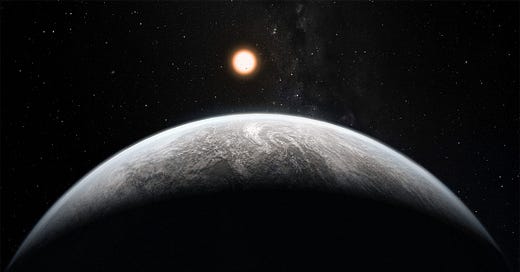your science briefing for 04.21.2025
Sniffing alien farts on what we think is the universe's most habitable type of planet, our universe may be spinning, why space tastes like a fruity cocktail, and more...
Planet K2-18 b is thought to be a Hycean World roughly 124 light years away. It’s the exact type of planet scientists were hoping is perfect for life not as we know it, but so similar that we could detect it. And it seems that now we have. Twice. The first found methane and carbon dioxide in the planet’s atmosphere, indicating gases associated with life. The second detected dimethyl sulfide and dimethyl disulfide. Here on Earth, these gases come from marine life like algae and plankton. We still don’t have enough data to definitively rule that we’ve managed to smell tiny alien farts across space, and we still need much more data, but this is the closest we’ve gotten… (Reuters)
note: the Bad Astronomer himself, Phil Plait, throws a whole lot of cold water on this claim by citing the uncertainties of whether a Hycean planet even exists (see links in the above paragraph) and other scientists disputing the strength and quality of the signal data. Which is a little disappointing, but it certainly wouldn’t be the first time a team of scientists got way ahead of themselves after an interesting discovery.
We’ve talked about why the universe looks broken to physicists today, and why we’re having so much trouble nailing down some basic mechanics of the cosmos. But there is a new idea trying to make sense of the universe given what we know, and it adds a small twist that could explain why we can’t tell how fast space is expanding, in what direction, or what’s driving it. What if the universe is spinning? This would change the way we measure cosmological distances and velocities, but the numbers add up if we assume a complete rotation of the cosmos over a few trillion years… (ScienceAlert)
If we have vaccines for 33 different diseases, vaccines that are effective and more or less suppressed humanity’s biggest scourges — regardless of what our Secretary of Plagues thinks in his delusional denial of germ theory — it seems like we should have a vaccine for the common cold, or at least a cure. So, why don’t we? The answer isn’t comforting, sadly. There are just too many quickly mutating variants under a common cold umbrella, and our only hope is to find one feature they all share able to take them all out in one swoop. Unfortunately, we’re just not there yet… (Popular Science)
“What does a galaxy taste like?” sounds like an updated zen koan, something along the lines of guessing the sound of one hand clapping, or the taste of silence. But, as bizarre as it might sound, spectral astronomy, which uses starlight passing through a dense cloud of gas, dust, or bouncing off a planet like K2-18 b mentioned above, and then uses the spectrum to identify through which molecules and atoms it must have passed, can actually give us an answer. Like an exotic, fruity drink. So, if you wanted to order a galaxy highball, it would taste like rum and raspberry given the composition of nebulae and dust clouds in distant galaxies… (Atlas Obscura)
While a lot of people are rightfully skeptical of generative AI being forced on them, as well as apprehensive about the intentions and grand promises of Big Tech about The Singularity and AGI that have become almost like the incantations of a cult, AI can do great things and help us solve complicated and urgent problems. But the trick is to keep humans in the loop and accelerate their creative process so they can figure out the best solutions after enough trial, error, and experimentation. Sadly, far too many of the MBA types running corporate America today now treat human creativity as just a problem to be solved, enraging their employees, getting significantly worse results in the process, and ending up with a thoroughly disengaged workforce… (Aftermath)
![[ world of weird things ]](https://substackcdn.com/image/fetch/w_80,h_80,c_fill,f_auto,q_auto:good,fl_progressive:steep,g_auto/https%3A%2F%2Fsubstack-post-media.s3.amazonaws.com%2Fpublic%2Fimages%2F93728edf-9a13-4b2b-9a33-3ef171b5c8d8_600x600.png)

![[ world of weird things ]](https://substackcdn.com/image/fetch/w_36,h_36,c_fill,f_auto,q_auto:good,fl_progressive:steep,g_auto/https%3A%2F%2Fsubstack-post-media.s3.amazonaws.com%2Fpublic%2Fimages%2F93728edf-9a13-4b2b-9a33-3ef171b5c8d8_600x600.png)

